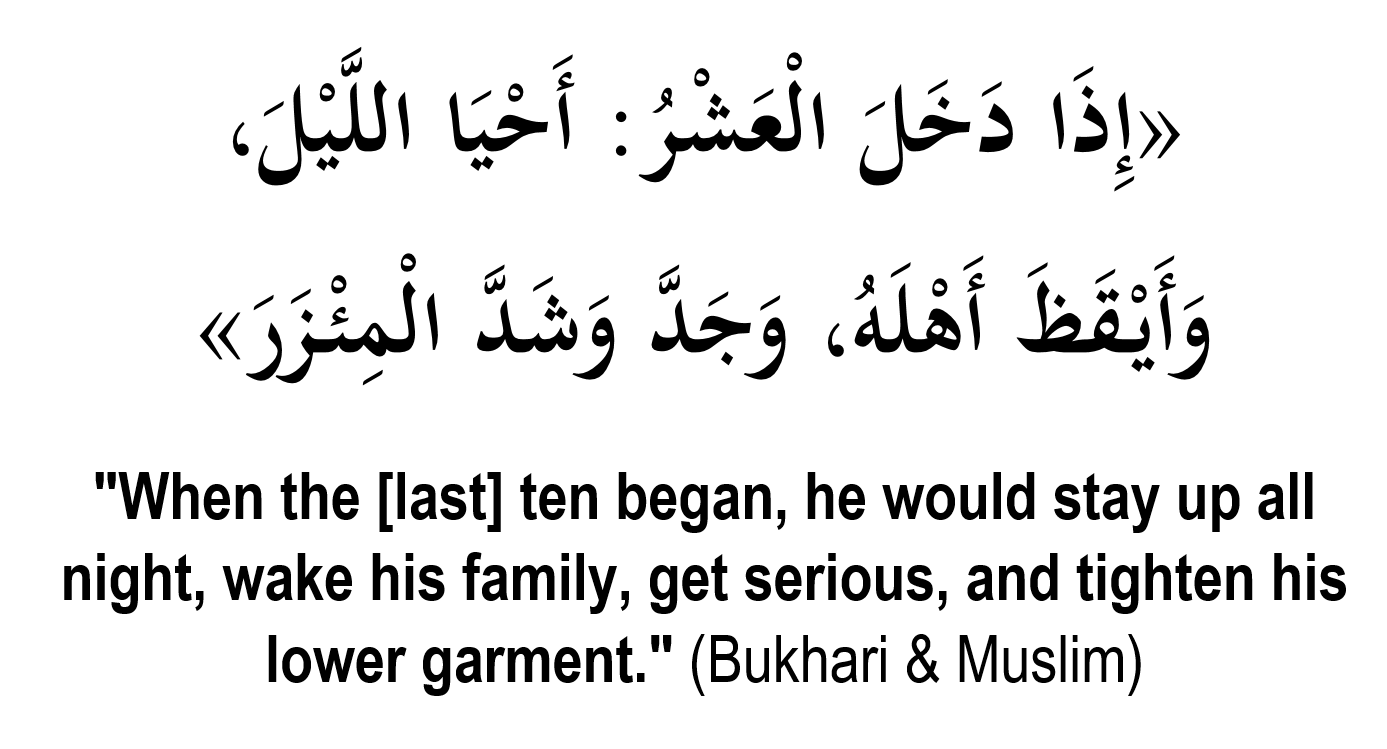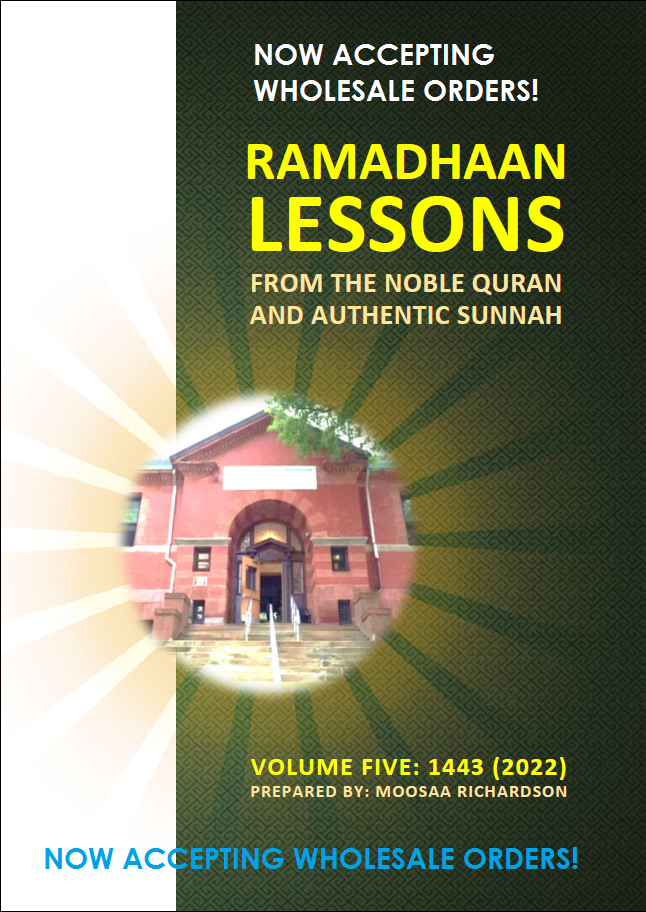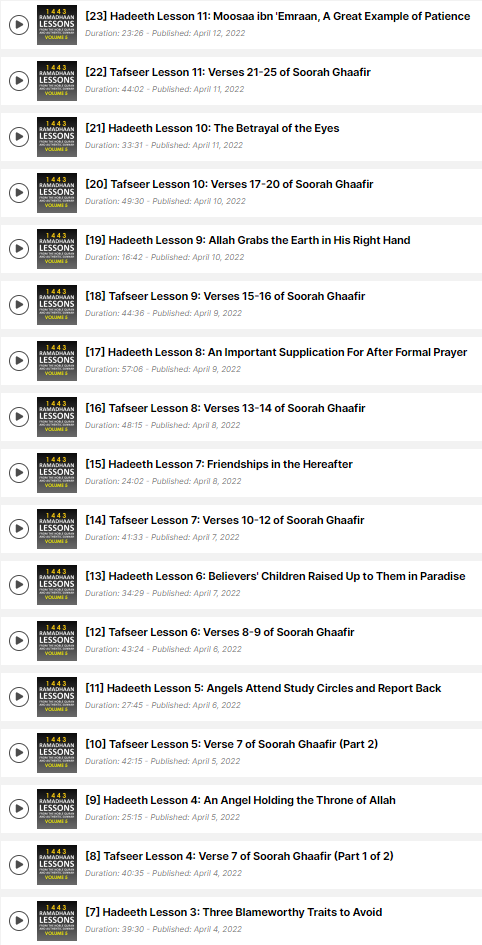In the Name of Allah, the Most Gracious, the Ever Merciful…
After mentioning the Sunnah of praying 11 and 13 rak’ahs at night, and that it is best, Shaykh Muhammad ibn Saalih Al-‘Uthaymeen (may Allaah have Mercy upon him) then said:
However, if the people of the masjid prefer that he (the imaam) shortens the length of the recitation and the length of the bowings and prostrations, and increases the number of rak’ahs, saying, “This is easier on us,” then there is no harm if he accommodates them, due to the generality of the statement of the Prophet (may Allah raise his rank and grant him peace):
“Make things easy and do not make things difficult.” [1]
And also due to the generality of his statement (may Allah raise his rank and grant him peace):
“When one of you leads, then let him shorten (the length of the prayer).” [2]
So long as we do not fall into anything prohibited, then bringing ease to those under our authority is better and takes precedence. The imaam is the one responsible for the masjid, having been put in authority over the praying people, thus he is called the “imaam.” The imaam is the one who has authority over them in affairs related to the prayer, for example he orders them to establish their rows and straighten them. So if the imaam is requested to be easy on them by increasing the number (of rak’ahs) while shortening the bowings, prostrations, and recitations, then there is no harm in that.
With this we must say that it is not befitting for us that we be excessive or neglectful, as some of the people commit ghuluw (excessiveness) when they stick to the Sunnah of the number (of rak’ahs), saying, “It is not permissible to increase upon the number that comes in the Sunnah,” and they speak in the sternest way against someone who increases upon that (by praying more than 11 or 13 rak’ahs), saying that he is sinful and disobedient. And there is no doubt that this is a mistake. How could he be sinful or disobedient when the Prophet (may Allah raise his rank and grant him peace) was asked about the night prayer, and he said:
“(It is) two (rak’ahs) by two (rak’ahs).” [3]
And he did not limit it to any set number. And it is well known that a person who asks about the night prayer does not know the number (of its rak’ahs), since the one who does not know how to pray the night prayer would more rightfully not know the number (of its rak’ahs). Furthermore, he (the questioner) was not from the servants of the Messenger (may Allah raise his rank and grant him peace), so we can not say that he knew about the affairs within his house.
So since the Prophet (may Allah raise his rank and grant him peace) told him about the manner that the night prayer is to be prayed, and he did not limit it to any set number, then it is known that there is leeway in the affair, and that a man may even pray 100 rak’ahs and then perform Witr with one rak’ah.
As for his statement (may Allah raise his rank and grant him peace):
“Pray as you have seen me praying.” [4]
Then this hadeeth is not unrestricted, even with those people (who say that 11 or 13 is the limit). They themselves do not say that it is obligatory on the people to perform Witr by praying five rak’ahs sometimes, seven rak’ahs other times, and sometimes nine. So if we understood this hadeeth in a general, unrestricted way, then we would have to say that it is obligatory to perform Witr by praying exactly five rak’ahs sometimes, seven other times, and sometimes nine. Rather, the meaning is, “Pray in the manner as you have seen me praying.” As for the number of rak’ahs, then no (this is not understood from the hadeeth), except that which is limited by a text.
Anyway, it is binding that a man not be harsh on the people in an affair that has some leeway. We have even seen some of the brothers who are harsh about this declaring imaams to be innovators, those who increase upon 11 (rak’ahs), and leaving the masjid, thus losing the reward that the Messenger (may Allah raise his rank and grant him peace) spoke of:
“Whoever stands (in prayer) with the imaam until he leaves, then it will be written for him that he stood a (complete) night (in prayer).” [5]
And perhaps they may sit out after having prayed ten rak’ahs, thus causing a gap in the row by sitting there. And perhaps they may even speak (while sitting out) sometimes, thus disturbing those who are praying. All of these (scenarios) are wrong. We have no doubt that they intend good, and that they were mujtahids (seeking to arrive at what is correct), however not every mujtahid is correct.
Another group of people take the opposite stance. They speak very harshly and sternly against those who restrict themselves to 11 rak’ahs, saying, “You have gone against ijmaa’ (scholarly consensus), and verily Allaah has said:
“And whoever contradicts the Messenger after the guidance has been made clear to him, and he follows a way other than the way of the believers, then We will turn him to that which he has turned himself to, and cause him to enter Jahannam, what an evil abode!” [6]
“All of those before you did not know anything other than 23 rak’ahs!” And they speak very harshly against them. This is also wrong…” [7]
…So then what if someone says, “You have established 11 rak’ahs (as the Sunnah), so then what do you say if we pray behind an imaam who prays 23 or more, should we remain seated and not pray with him when he stands for the sixth tasleem (after 10 rak’ahs), or is it better to finish with him?”
The answer: It is best to complete (the prayer) with him; the evidence for that is from two angles:
The first one is the statement of the Prophet (may Allah raise his rank and grant him peace) about the night prayers of Ramadhaan:
“Verily whoever stands (in prayer) with the imaam until he leaves, then it will be written for him that he stood a (complete) night (in prayer).” [5]
So whoever remained seated and waited for the imaam to reach the Witr Prayer, then he has not prayed with the imaam until he has left, since he has left off a portion of his prayer.
The second angle of proof is the generality of the statement of the Prophet (may Allah raise his rank and grant him peace):
“Verily the imaam has only been appointed to be followed.” [8]
This includes every action the imaam does, so long as it is not a forbidden one, and praying more than 11 (rak’ahs) is not forbidden, so then we follow the imaam. However, if the increase is forbidden, like if the imaam prays five rak’ahs for Thuhr Prayer, then we do not follow him.
Furthermore, we must know that the unity of the Ummah is something sought after with the highest priority from the Islaamic Sharee’ah, since Allaah has said:
“And this is your Ummah, a single Ummah.” [9]
And differing between members of the Ummah is something to be rejected, as Allaah the Most High has said:
“And do not be like those who split up and differed after the clear proofs came to them.” [10]
And Allaah the Most High has said:
“Allaah has legislated as part of the Religion that which he enjoined upon Nooh, that which We sent down to you, and what he enjoined upon Ibraaheem, Moosaa, and ‘Eesaa: That you establish the Religion and do not be divided over it.” [11]
And He, the Most High, has said:
“Verily those who split up their Religion and became sects, then you have absolutely nothing to do with them. Rather your affair is solely with Allaah, and He will inform them of what they used to do.” [12]
And the Prophet (may Allah raise his rank and grant him peace) used to say when lining the people up for prayer:
“Do not differ, or your hearts will differ.” [13]
And when ‘Uthmaan (may Allaah be pleased with him) prayed the prayers that have four rak’ahs during Hajj in Minaa, he did not shorten them after the eight years of his khilaafah had passed. The people detested this, saying, “The Prophet (may Allah raise his rank and grant him peace) shortened (his prayer), and so did Aboo Bakr and ‘Umar, as you did in the beginning of your khilaafah.” However, he (may Allaah be pleased with him) changed his position, and those Companions that spoke against this action of his still prayed four rak’ahs behind him, while detesting it. This was while this increase was inseparable from the prayer, and it was an evil thing to them, however they still followed the imaam, preferring unity.
So what do you think about when the increase is separate, not directly connected to the prayer, when a person does it intentionally it does not nullify the prayer? And he (the one who does not pray more than 11 or 13 rak’ahs with the imaam) says, “We are people who stick to the Sunnah and follow the narrations from the Companions,” with this contradiction of his in this issue.
So I say: Surely any person that says he follows the Sunnah and the guidance of the Salaf, it is not for him to abandon the imaam when he prays 23 (rak’ahs) and say, “I will follow the Sunnah and pray 11 rak’ahs,” since you have been ordered to follow your imaam, and you have been prohibited from contradicting (him). Furthermore, you have not been prohibited from praying more than 11 rak’ahs.
So then it is binding upon the students of knowledge specifically, and upon all people in general, to be vigilant in preserving unity whenever it is possible, since the only hope for the people of disobedience and the criminals is that the people of goodness differ. This is because they have no weapon more effective than differing, and verily Moosaa said to the magicians:
“Woe to you, do not invent lies against Allaah, lest he wipe you out with a (single) punishment, for those who lie will suffer loss. Then they differed over their affair between themselves.” [14]
Once they differed, they failed and lost their strength.
So this differing that we find with some of our brothers who are (overly) stern in following the Sunnah in this issue and others, I view it as a contradiction to the Sunnah and to the goals of the Sharee’ah, like the unifying of the positions and the unity of the people, since this, and to Allaah is the praise, is not something that is haraam nor is it a munkar, rather it is something that is based upon ijtihaad. So as for us bringing about division and causing the hearts to have animosity, hatred, and mockery for the one who opposes our position, while it is permissible and not in opposition to the Sunnah, then it is obligatory on every man to protect and guard over the unity of the ranks whenever possible. [15]
Translated by: Moosaa Richardson (1423/09/04)
FOOTNOTES:
[1] Al-Bukhaaree (69) and Muslim (4503)
[2] Al-Bukhaaree (703) and Muslim (1046)
[3] Al-Bukhaaree (473) and Muslim (1746)
[4] Al-Bukhaaree (631)
[5] Sunan An-Nasaa’ee (1605) and Sunan At-Tirmithee (806); Al-Albaanee called it saheeh.
[6] the meaning of Soorah An-Nisaa’ (4):115
[7] As-Sharh Al-Mumti’, 4/52-54
[8] Al-Bukhaaree (732) and Muslim (920)
[9] the meaning of Soorah Al-Ambiyaa (21):92
[10] the meaning of Soorah Aali ‘Imraan (3):105
[11] the meaning of Soorah Ash-Shooraa (42):13
[12] the meaning of Soorah Al-An’aam (6):159
[13] Muslim (971)
[14] the meaning of Soorah Taa-Haa (20):61-62
[15] Ash-Sharh Al-Mumti’, 4/61-63



